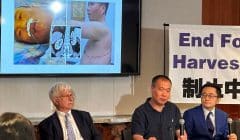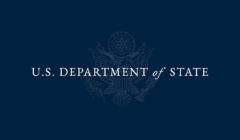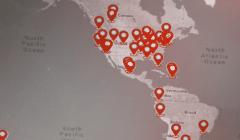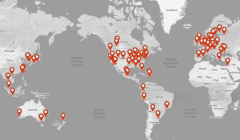International Experts Call for ‘End of Diabolical Crime’ of Forced Organ Harvesting

Over the past twenty years, several hundred thousand or more Falun Gong practitioners have been victims to forced organ harvesting, according to Doctors Against Forced Organ Harvesting (DAFOH). The diabolical practice of forced organ harvesting from living, non-consenting individuals has been recognized as a crime against humanity but has existed and will continually grow if the international community delays action.
The World Summit on Combating and Preventing Organ Harvesting convened from September 17-26, with 35 experts in medical, legal, political, media, civil society, and policymaking from 19 countries participating. This virtual summit calls attention to the forced removal of organs while also stressing the ethical responsibilities and instrumental role international sectors have in ending the atrocity.
In as early as 2006, credible reports of organ harvesting have been collected. Since then, numerous independent investigations by leading experts have come to the irrefutable conclusion that forced organ harvesting has been and still is occurring in China and even grown more rampant, extending to other prisoners of conscience such as Uyghurs, Tibetans, Christians, and citizen dissidents.
The issue though extends beyond the victims and perpetrators of the crime and into the international community, from citizens to policymakers. This article provides an overview of organ harvesting as well as how international, multidisciplinary cooperation is needed to end the crime.
Irrefutable Evidence: A Lucrative and Far-Reaching Crime
“[Organ harvesting is a] horrific practice is beyond our imagination and thinking as human beings”, said Dr. Torston Trey, executive director of DAFOH.
“[However,] Implausible transplant numbers; inconceivable short wait-times for transplantation that can be shortened to as little as two days if one pays an extra premium, a public organ donation program that claims to operate on an efficiency level that is unheard of in other countries; admissions on phone calls, and last but not least, a plethora of eyewitness testimonies that leave no doubt [organ harvesting exists.]”

Numerous independent studies by experts back these accounts. These include the 2006 report from David Matas and Divide Kilgour, a 2015 report by Ethan Gutman, the 2016 report Bloody Harvest, and the China Tribunal chaired by Sir Geoffrey Nice in 2019. At present, the Tribunal illuminates itself as one of the most comprehensive accounts of organ harvesting.
As G. Weldon Gilcrease, Director of Oncology and professor at University of Utah School of Medicine summarized:


“… [in 2019,] the China tribunal had just published their report in which they had interviewed well over 50 individuals, and looked at all the data and reports themselves, mostly data that came out of China showing that they had no explanation for their incredible and exponential boom and transplant activity beginning in the early 2000s, aside from the explanation that they were killing innocent individuals for their organs. This kind of egregious, and mass crime has never really been at the hand, so largely, of the medical community in history.”
The International Coalition to End Transplant Abuse in China provide an overview of compelling evidence in the following video:
Further evidence can be found on our dedicated webpage.
The impact of forced organ harvesting though has extended beyond the borders of China and the medical community.
Dr. Shi-wei Huang, Director of Urology for National Taiwan Hospital’s Yunlin branch, observed, “As early as 2001, I noticed that many Taiwanese flooded to China for organ transplants… Taiwanese began going to China to receive kidney transplantation in the 1990s, but the number increased rapidly since after 2000…. In the past 20 years, over 4,000 Taiwanese went to China liver or kidney transplants.”
Other than Taiwanese patients, transplant patients from other East Asian and Western countries were also traveling to China for organ transplants.
“We know between 2000 and 2006 China had many organ banks. They were managed and operated by the People’s Liberation Army (PLA),” said Dr. Huang. The organ banks are estimated to hold several thousand donors at any time.
China’s organ transplant system is now a multi-billion dollar industry, according to the International Coalition to End Transplant Abuse in China. Well-known estimates also indicate there are 60,000-100,000 transplant surgeries performed in China each year.
This is concerning, considering the reports of the number of Falun Gong practitioners being incarcerated for their faith, as the number of consenting organ donors in China is nowhere near the number of transplant numbers and that a large number of Falun Gong practitioners (who are healthy from the practice) are detained for their faith.
Dr. Maria Cheung, the associate dean at the Faculty of Social Work at the University of Manitoba, also found from recent research data that 75% of refugees who practiced Falun Gong in had been subject to selective screening procedures for organ harvesting while they were in China.
Based on available information collected by Minghui.org, in the first half of 2021, at least 129 Falun Gong practitioners had their blood drawn and DNA samples collected by authorities, indicating a possibility of organ harvesting.
International Complicity
Fifteen years since the first reports of organ harvesting were publicized, however, indicates the problem of forced organ harvesting is more penetrating than a simple visage.
The crimes against humanity have been allowed to continue, and even burgeoned under conscious and unconscious international complicity.
Many have likened the crimes of forced organ harvesting to the atrocities committed during the Holocaust. As Dr. Trey said:


“In fact, in both cases [the atrocities committed against the Jewish in the Holocaust and forced organ harvesting of Falun Gong and other groups] these are international cases… not only because of its character of being a crime against humanity, but in particular in the context of forced organ harvesting with its ties to international transplant tourism, academic exchange of transplant knowledge, training of Chinese students and trading of transplant related drugs and technical supply…”
In the medical community, Chinese students continue to study in transplant centers internationally, and the medical community continues to have exchanges with China. When a director of an organ transplant program in the United States approached school leadership to ask them to stop conducting exchanges with China and Chinese students, the leadership denied his request due to fear of political and economic retaliation.
Major international media have also been compromised. China spends million dollars in advertising in influential Western media, such as the New York Times, the Wall Street Journal. They have also offered media companies exclusive and profitable deals, influencing media to have a pro-China stance. Thus, there is little reporting of organ harvesting.
As Zoe Valdez, a Cuban journalist and author, remarked of the atrocities committed by the Cuban government:


“What happened after these horrendous practices and isolated denunciations? Invasive silence, complicit silence. The same silence we are witnessing in the face of organ harvesting in China that has claimed, and continues to claim, the lives of thousands of dissidents, of prisoners of conscience. We cannot allow it.”
These examples are not to say that the international community is not responding, but it must continue on a larger scale.
Lord Hunt of Kings Heath, former Health Minister of the U.K., said that “Spain, Italy, Taiwan, Israel, Belgium, Norway, and South Korea have already taken legislative action to prevent organ tourism in China… [and] International government action must continue. It is all our duty to act when we see innocent people falling victim to such dreadful crimes.”

The World Summit on Combating and Preventing Organ Harvesting has issued a Universal Declaration for Combating and Preventing Forced Organ Harvesting allowing individuals and entities to take a stance. More details can be found here.
Sources:
https://en.minghui.org/html/articles/2021/9/23/195869.html










